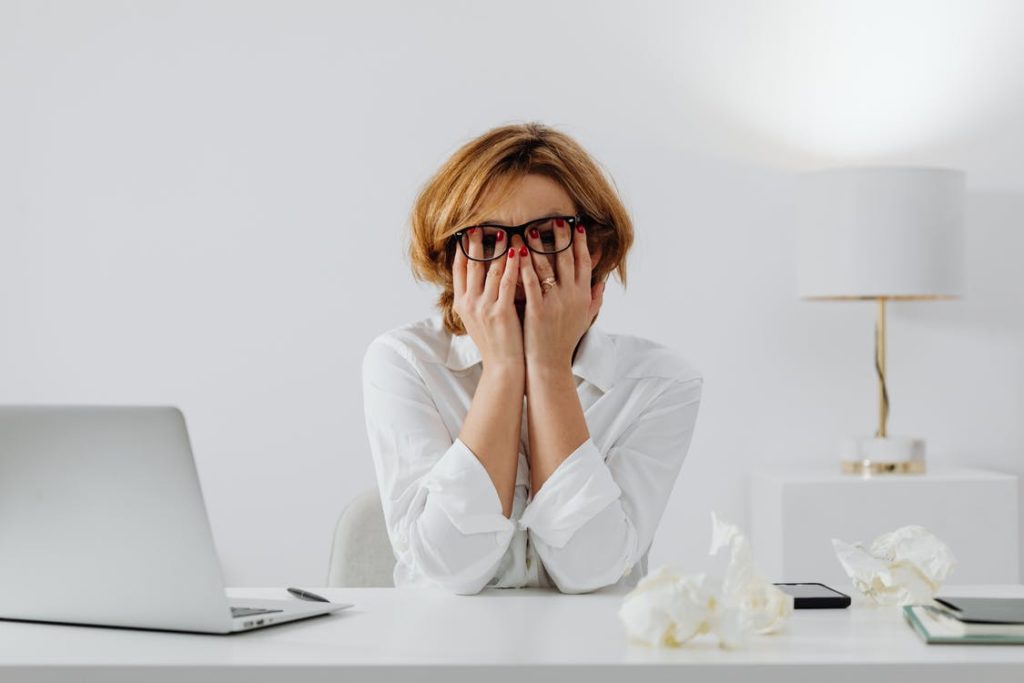Modern-day technology is beneficial in a lot of ways. We have useful information at our fingertips and can connect with people all around the world. However, there are also ways that modern-day technology can increase our stress and anxiety levels.
These days, many of us have instant and constant access to the internet and other modern technology. This may have made our lives easier in many ways. It is now easier to search for answers to questions or find nearby restaurants, doctors, and grocery stores. Is there a connection to anxiety?
Anxiety can be related to many different circumstances, including financial stress, worries related to health, or work-related burnout. Anxiety can cause intrusive thoughts, sweating, increased heart rate, and other distressing symptoms.
Anxiety affects everybody in different ways, and everybody uses technology differently. For some people, technology may be wholly beneficial, but it could contribute to stress levels and poor mental health for others. There are also ways that technology may be beneficial for mental health.
For example, it is now easy to find a therapist online or seek advice from online studies and resources. Check out this link to learn about cognitive behavioral therapy and how it may benefit you: https://www.betterhelp.com/advice/therapy/if-you-have-an-anxiety-disorder-cognitive-behavioral-therapy-could-work-for-you/
Technology & Anxiety Research

There is evidence that suggests that there is a correlation between anxiety levels and the usage of technology. One study found that teens who spend more time on their devices and less time participating in face-to-face social interaction and exercise had worsened psychological health. The study even showed that their mood and happiness declined when they began to participate in more technology-related activities.
It is good to look at some of the ways that technology could be contributing to your anxiety levels.
Also read: How to Find a Great Online Therapist
Uncertainty & Access to Information
Anxiety and uncertainty are related because anxious thoughts tend to arise when we do not know the outcome of something. Technology provides us with answers at the touch of a button. We can find reviews, maps, answers, and more on smartphones that travel with us. This is useful, but it does not allow us to practice uncertainty management that arises in the real world.
Uncertainty will always arise in life, and there will not always be a good answer for that uncertainty online. A search engine cannot answer your questions concerning career choice, love interest, or difficult parenting decisions.
It may be difficult at first, but next time you have a concern or question, try to resist the urge to look it up online. Instead, ponder the question like we did before the internet or come up with a solution on your own.
Fear of Being Disconnected
Many of us do not go anywhere without a smartphone in our pocket and may even dread the day that it breaks when you have to go without it until you purchase a new one. We are reliant on our devices for directions, information, and social connections.
Sometimes, a notification creates a strong urge and desire to look at your phone even if you are doing something important. In addition, a lot of people will turn immediately to their smartphone when they become bored, lonely, or stressed. This is because our entire lives are on our phones, from banking apps to pictures of family and or music collection; it is all accessible using a phone.
A good way to ease the anxiety related to our constant connection to our smartphone is to create boundaries. Try to keep your phone in your pocket during a meal or stop using it 2 hours before bedtime. You may even want to set an amount of time that is acceptable to use your phone each day.
Reduced Face-to-Face Interaction

Face-to-face interaction is important for mental health. However, with email, social media, and text messaging, many people find the social interaction that they crave without seeing someone in person. Technological connection, albeit useful and beneficial in many ways, is not a substitute for face-to-face interaction.
It is important that we see the people that we care about in person. Try to do something with friends and family at least once a week, whether it is just watching a movie or going out to eat. This face-to-face interaction is important, and even video calls are not beneficial in the same way.
In addition, text messages and emails do not always provide the same types of emotions that would be present when you speak with someone in person. A short response may seem indifferent, or a caring text may sound sarcastic. This can cause elevated anxiety levels.
24 Hour Messaging
We now have communication access to everyone in our social bubble at all hours of every day. This can cause anxiety in a number of ways. First, knowing that they see their phone often can cause anxiety when they do not respond immediately. Even seeing that the message you sent was read can contribute to anxiety. Then, when you see that they are messaging back, you may have stress about their response.
In addition, our interactions with friends, family, and coworkers can be done at any time. Being able to connect at all hours of the day, or to complete work, whether it is the middle of the night or the early morning, can cause stress and anxiety.
In addition, in order to destress from work, you should set clear boundaries. Do not check or respond to emails before or after a certain time and be sure to leave yourself days off that are free from work-related stress and anxiety.
You may also want to distance yourself from your phone and participate in something that you enjoy. This may mean that you spend time with someone you care about in person or that you participate in a hobby.
Technology as Escape
It is common to use technology as a way to cope with stress and anxiety. You may look at articles online or social media posts as a way to escape reality and the stressors of our everyday lives.
This is not a healthy way to cope with anxiety levels, and this constant connection may even contribute to increased anxiety. This attachment and relationship with technology may be caused by positive reinforcement. If we use the technology to avoid a negative feeling and get rewarded with something positive like a funny video or image, then phone use becomes reinforced.
It is important to pursue positive relationships, and doing so means that you have to set boundaries on phone usage. When you are with other people, try your best not to use your phone. Live in the moment. You can even practice mindfulness in order to promote a sense of calm instead of reaching for your phone when you feel stressed.
Gaming Addiction

There are tons of fun games online, but they can also be addictive. Online games can provide a sense of community, and even one-person games can give us a sense of accomplishment. However, it is important that we do not use too much of our time playing games on our phone, tablet, or computer.
To avoid the anxious feelings related to gaming, you need to reduce the amount of time that you do so in the first place. Try to set a time each day that it is okay for you to play a game, and then be sure to eat healthy foods and exercise regularly. These healthy activities can boost your mood and break up the amount of time spent on the device.
Judgments and Comparisons
Social media connects us to others, but it also allows us to see constant videos and photos of others constantly. These social media posts can make us critique our own lives and compare ourselves to the people online even though social media offers only a very limited and positively swayed glimpse into their lives.
We may also feel the need to post throughout the day in order to be accepted or to seem like we are doing well in the eyes of others. We may take selfies or pictures of meals. This can influence our mood and cause constant anxiety about the online image that we present. It also sets up unrealistic expectations for us to be perfect in front of our friends, family, neighbors, coworkers, and even strangers online.
Always try to remind yourself that the images online are not an accurate depiction of an entire person’s life. In addition, they may be edited to provide an unrealistic image of their life or themselves.
Also read: 6 Best Things to Do While Stuck Inside: Coronavirus Quarantine
Final Thoughts on Technology and Anxiety
We are constantly connected, and this can be stressful. It can cause us to worry about the way people perceive us online or cause us to have unclear boundaries between work and personal life. It may even cause us to utilize technology as a tool for escape or as a coping mechanism.
Technology can be great. We can use it to connect with old friends or see family members who live far away. We can use it to access information that is important to us. However, it is also important that you set clear boundaries on your use of technology and to make sure that you engage in healthy behaviors. Make time to exercise and see the people you care about in person. Doing so can improve your mental health and wellbeing.
About Author: Marie Miguel has been a writing and research expert for nearly a decade, covering various health-related topics. Currently, she is contributing to the expansion and growth of a free online mental health resource with BetterHelp.com. With an interest and dedication to addressing stigmas associated with mental health, she continues to target subjects related to anxiety and depression specifically.
